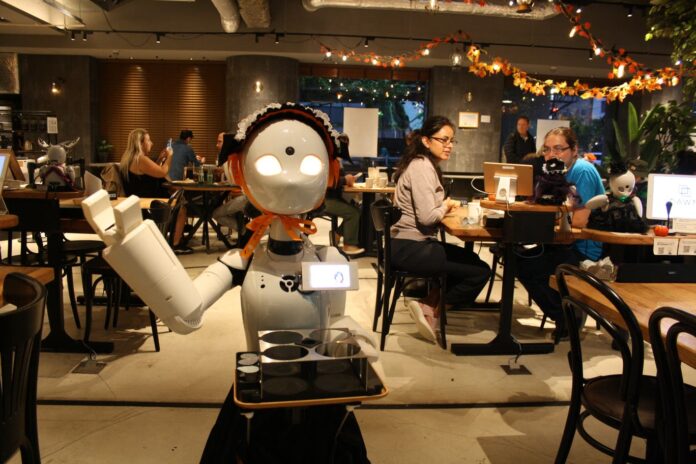Inventor Kentaro Yoshifuji’s robots allow people to work at the Dawn cafe from anywhere in the world – ‘teleportation’ technology that could open up new demographics for Japan’s flatlining economy.
Japan is running out of workers. With an unemployment rate of just 2.5 per cent, a rapidly ageing population and declining birth rate, finding enough people to fill roles as taxi drivers, baristas and waiters is proving a major challenge to the country’s economy.
One inventor has created a solution that not only allows disabled people greater access to the workplace, potentially tapping into a hugely underutilised section of the population but could one day let older people keep active even as their bodies age – and stave off loneliness in the process.
At the Dawn cafe in central Toyko, diners are greeted as they come in the door not by a person, but by a robot avatar. It has a friendly voice, two arms with which to gesticulate for emphasis, and a smooth face modelled on a Noh mask from traditional Japanese theatre.
Another robot accompanies the diner at their table, taking their order and engaging them in friendly chat about their day or, as is often the case with tourists, their visit to Tokyo. And, finally, a third robot brings them their coffee, carrying a tray to the table.
Yoshifuji doesn’t say he has invented a robot – he says he has invented “teleportation”.
Robots and their pilots make up a large portion of the staff at the Dawn – there are as many as 90 on the company’s roster – though the food and drink preparation is still largely done by humans. But it means that if on any given day if there are half a dozen staff visible at the cafe, at least that many are also being employed remotely from their homes.
One thing the company is keen to emphasise is that this is not only a solution for disabled people the job helps combat the homesickness that crept in for Japanese expats in Europe. By meeting people in the cafe in Tokyo, by teleporting there a few times a week, they maintain a closer connection with their home country.
Yoshifuji has much broader ambitions for the difference his avatars can make to Japanese society – he envisages them being used throughout the country’s schools, colleges and major offices, breaking down the mobility barriers preventing higher numbers of disabled people from completing their studies or joining the workforce.

